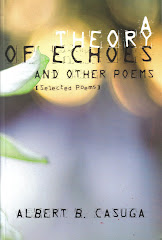08 January 2009
Literariness
Philosophers get away with answering the question "What is philosophy?" with the serious answer "Philosophy is what philosophers do." Similarly, literary theorists define literariness as "what makes literature literature." The term is usually attributed to the Russian Formalists, who were early 20th century critics, but the concept can be traced all the way back to Aristotle and even to the earlier Chinese literary theorists. Like all ideas, literariness has had its share of detractors, the most common insisting that it does not exist, i.e., that there is nothing particularly unique about literature. Some critics claim that everything written is literature (as in "Review of the Literature" in a scientific journal article). Some claim that even everything not written is literature (as in saying that we can read a silent film or read a person or read the traffic in a city). Some scientists have countered by experimentally proving that it exists (see, for example, Miall and Kuiken 1999). I welcome such empirical moves to defend the notion of literariness, but I prefer to take the logically circular route: literariness is what makes a literary text literary. You cannot argue against a circular definition because there is no way to break into the circle. It is like what the Structuralists used to say about language: take any dictionary of any language and you will realize that a dictionary is always self-referring (if you look up every word in any definition and follow it through every word defining it in turn, you will eventually end up with the original word being defined). What seems clear is that, if there is such a thing as literariness, it must have something to do with language, and if it has to do with language, then using a second language must have something to do with literariness.
Posted by Isagani R. Cruz at 3:19 AM
Albert B. Casuga said...
How must "literariness" be defined for it to mean the quality of some piece of writing? If language is the primary equipment of "literature", what kind of language must be used to express literariness? Is it "charged language"? Is it content "objectified" as "slices of life" in order to "subjectify" an experience that assumes "meaning" in order to engender an aesthetic reaction or appreciation (in various levels of consciousnss or even subconsciousness).
Language, a fortiori, is the primary cause of literariness. Units of meaning in terms of figures of thought and of language shape what is referred to as "achieved content." It seems to me that the better question is whether or not the use of a "second language" can create "literariness" in a piece of literature written by one who has a first language or a "lingua franca".
When I wrote my earliest poems in Ilocano, were they "more literary" than when I used Spanish or English in my later works? Are my aesthetic experiences better nuanced in my childhood language (Ilocano) than in my professional language as a newsman, an academic, and as a creative writer? Are my Ilocano poems more authentic than my Spanish or English poems. Are the latter inchoate because the language used is learned later in life?
As far as I am concerned, I write in the English I learned from school, from reading, from teaching, from writing, and from living in a milieu where it is used to communicate in order to form relationships. I do a better job being "literary" in this second language which has become my first language.
I regret not having acquired proficienecy in Japanese (another colonizer's language) which might have given me a broader dimension of creativity and world view together with the other languages I found myself surrounded with as spoken by my Cartilla-educated abuelos and abuelas, Filipino-American-educational-system-educated parents, and colleagues who tried to write and speak in American as opposed to the King's English I favoured.
Your conclusion about second language having something to do with "literariness" seems to be a tautology -- in that one produces literary literature in whatever language he feels competent in defining whatever phenomena he wishes to use as a manner of "knowing" his "being' and "becoming" as well as shaping up an epistemological construct he could share with any number of audiences/readers. More next time. -- ALBERT B. CASUGA
23 January, 2009 10:24
UAW strike at Daimler Truck averted at 11th hour
-
More than 7,000 Daimler Truck workers, most of them in North Carolina, had
threatened to go on strike. The UAW says the workers will get raises of at
least...
3 hours ago










